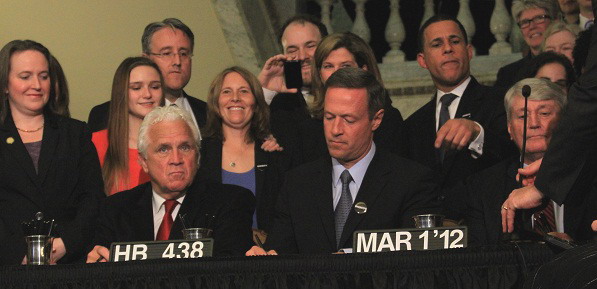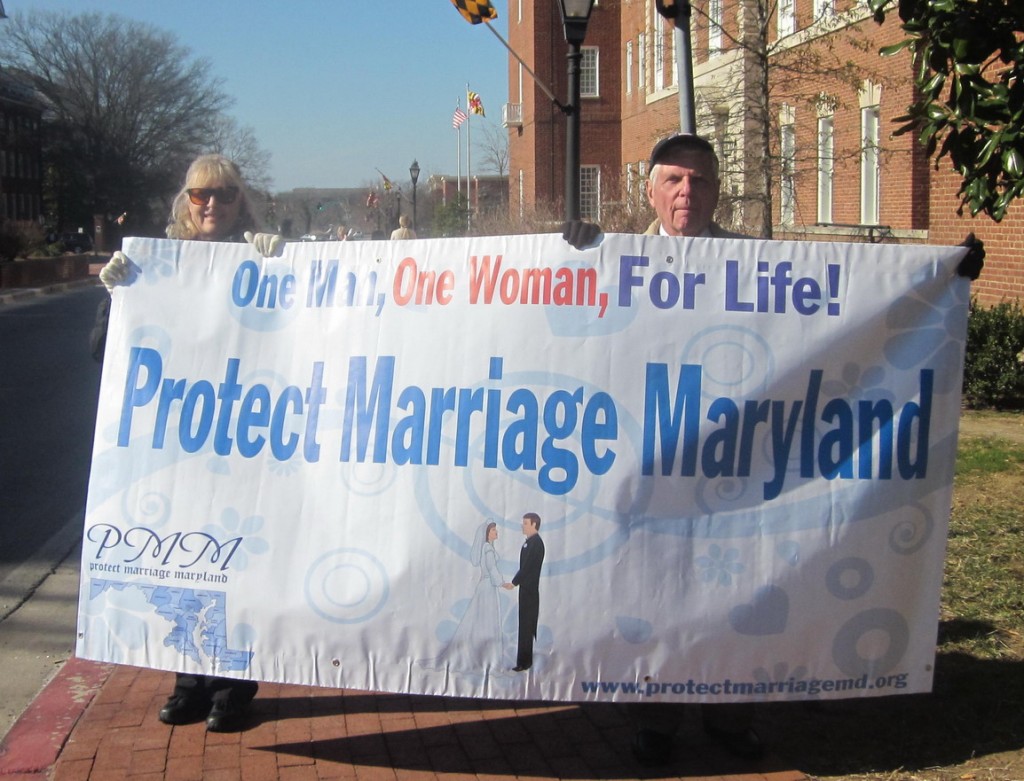Both sides gear up for same-sex marriage fight

Senate President Mike Miller, Gov. Martin O’Malley and House Speaker Michael Busch as governor signs same-sex marriage bill.
By Caitlin Johnston
Capital News Service
ANNAPOLIS — Gay rights activists, religious leaders and politicians are gearing up for two months of campaigning on the Maryland referendum to strike down same-sex marriage legislation that passed in March.
Hot off the political conventions in Tampa and Charlotte, volunteers will be staffing nightly phone banks, canvassing door-to-door and finding ways to make same-sex marriage a personal issue for voters.
“This is not something that’s esoteric or theological,” said Maryland Sen. Allan Kittleman, R-Howard, the only Republican senator to support same-sex marriage. “These are real people who are living in our state that are unable to receive the benefit that others have simply because of their sexual orientation.”
Maryland became the seventh state to legalize same-sex marriage when Gov. Martin O’Malley signed the Civil Marriage Protection Act in March. But the act takes effect in January.
Those who oppose same-sex marriage gathered more than 113,000 signatures for a petition to put the issue on this fall’s ballot.
Ballot wording can be confusing
Both sides are concerned about the language on the ballot. The wording can be confusing for voters, said Del. Cheryl Glenn, D-Baltimore, an opponent of same-sex marriage.
Voting “for” the same-sex marriage referendum is a vote in favor of the current law and will allow gay and lesbian couples to obtain a civil marriage license.
Glenn said she will hold town hall meetings explaining the language of the referendum and providing speakers from both viewpoints.
“The more questions we can answer, the easier it is for people to come to a better understanding of what they believe,” Glenn said.
Glenn and Kittleman are in some ways exceptions, as neither has taken the stance traditionally associated with their party. January 2012 polling data by Gonzales Research & Marketing Strategies found 62 percent of Democrats supported same-sex marriage and 76 percent of Republicans opposed it.
Glenn’s opposition does mirror that of many others in the black community who are more likely than whites to oppose same-sex marriage.
Proponents call it a civil right issue
Proponents of same-sex marriage call it a civil rights issue that comes down to equal treatment for all. Detractors counter that it’s about protecting the sanctity of marriage. Those same rights, they say, could be found through alternate paths such as civil unions.
Maryland Marriage Alliance, a non-partisan interfaith coalition dedicated to preserving the traditional definition of marriage, has an office in Annapolis and will open others throughout the state to facilitate volunteer training, workers and phone banks.
If the referendum fails, Maryland would be the first state south of the Mason-Dixon Line to legalize same-sex marriage, and potentially the only state where same-sex marriage survived a vote at the ballot box. Each of these mile markers is significant on its own, said Kevin Nix, spokesman for Marylanders for Marriage Equality.
“The fact that Maryland could be first would be monumental,” Nix said. “It would just be another sign that the country is moving toward equality and fairness, not away from it.”
Maryland is one of the first states, along with Maine and Washington, to put the issue on the ballot after President Obama announced his support of marriage equality last spring. His remarks, and resulting support from the National Association for the Advancement of Colored People, have emboldened both sides.
“The president coming out in May and supporting marriage for gay and lesbian couples combined with NAACP’s endorsement both go a long way toward getting the conversation really going in all kinds of communities, including the African-American community,” Nix said. “I think that dynamic plus actually having a successful vote on the ground in a state, again, will contribute heavily to the momentum we already have nationally.”
Support added to Democratic platform
The Democratic Party added support of same sex marriage to its platform at the convention in Charlotte last week. But some Democrats, such as Glenn, worry that such an endorsement might hurt Obama’s re-election in swing states.
“The way this issue has been framed by the party, I think is very disingenuous,” Glenn said. “It appears people feel that in order to support President Obama, you have to support same-sex marriage and some of the other issues like the Dream Act. You can vote independently on those issues.”
If same-sex marriage survives in Maryland, which votes on three other referendums in November, it could be the tipping point for the national movement. More than half of the states have faced referendums defining marriage as the union of a man and woman, and each time, voters have approved those amendments. But a lot has happened since other states held those votes, Nix said.
“The last time this was on the ballot was four years ago, and a lot’s changed in those four years,” Nix said. “This is a new world. We’ve seen poll after poll nationally show that a clear majority of Americans support marriage equality and that number, that majority, is growing.”
Actually, North Carolina voters approved a constitutional amendment banning same-sex marriage in a referendum this May, with 61% support. It became the 30th state to pass a constitutional ban, the New York Times reported.
Polls show a close race
But Maryland voters are locked in a dead heat, according to the same January 2012 Gonzales poll data, with 49% supporting the legalization of same-sex marriage and 47% opposing. Given the plus-or-minus 3-percentage points margin of error, that leaves the issue up for grabs for either side.
However, a poll for Marylanders for Marriage Equality by Hart Research Group done with a smaller sample in August found 54% of Marylanders say they would vote for the law that allows gay and lesbian couples to legally marry, while 40% say they will vote against this law. “This 14-point support margin is a marked improvement over the eight points we measured this past March (51% vote for, 43% vote against),” said the pollster’s analysis.
The close race and potential implications nationwide have donors pouring millions of dollars into the state.
Millions pour into the fight
The Human Rights Campaign, the nation’s largest gay-rights lobby, recently spent another $250,000 in Maryland, raising the organization’s total spent on the state’s battle over same-sex marriage to more than $1.6 million.
While funding is important, Nix said the key to winning this debate goes back to grassroots campaigning and making sure people are engaging in conversations. And that’s something both sides agree on.
“We’re going to be showing up at events, we’re going to be engaging people from businesses to churches to organizations across the state,” said Derek McCoy, spokesman for the Maryland Marriage Alliance.
Both McCoy and Nix said the fundamental goal for the fall is to be a catalyst for conversations.
“We’re encouraging people of all walks of life to have those conversations,” McCoy said. “Have them with your kids, have them with your friends. The important part is to have them.”
MarylandReporter.com added content to this story.

MarylandReporter.com is a daily news website produced by journalists committed to making state government as open, transparent, accountable and responsive as possible – in deed, not just in promise. We believe the people who pay for this government are entitled to have their money spent in an efficient and effective way, and that they are entitled to keep as much of their hard-earned dollars as they possibly can.


